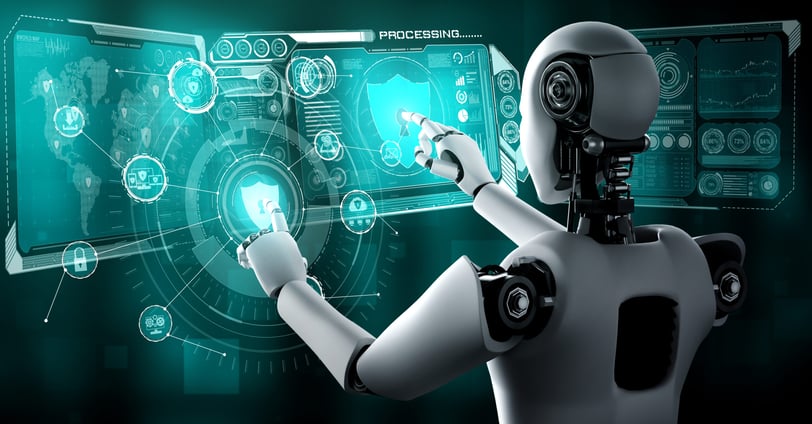The Future of Artificial Intelligence: How AI is Transforming Industries in 2025
Artificial Intelligence (AI) is no longer a futuristic concept—it’s already revolutionizing various industries. From automating routine tasks to making complex decisions, AI is changing the landscape of how businesses operate, innovate, and serve customers. In this post, we’ll explore how AI is reshaping industries in 2025, with a focus on the latest advancements and trends.
3/29/20252 min read


1. AI in Healthcare: Saving Lives with Technology
AI is playing a huge role in the healthcare sector, especially with the integration of AI-driven diagnostics and personalized treatment plans. By analyzing vast amounts of medical data, AI helps doctors make faster and more accurate diagnoses. For instance, AI algorithms are now capable of detecting early signs of diseases like cancer, heart conditions, and diabetes, making early intervention more possible than ever.
Additionally, AI is enhancing drug discovery by simulating biological processes and predicting the effectiveness of new treatments. In the future, AI will help healthcare systems become more efficient, reducing costs and improving patient outcomes globally.
2. AI in Finance: Smarter Decisions and Better Security
The financial industry is embracing AI to improve everything from trading to fraud detection and customer service. AI-powered algorithms help analysts predict market trends, allowing investors to make smarter decisions. AI tools also monitor financial transactions in real time, identifying suspicious activities and preventing fraud.
Moreover, in banking, AI-driven chatbots are becoming the norm, offering personalized customer service 24/7. These chatbots can answer queries, help with account management, and offer tailored financial advice.
3. AI in Retail: Personalized Shopping Experience
AI is revolutionizing the retail industry, both online and in-store. AI helps retailers offer a more personalized shopping experience by analyzing customer behavior and preferences. AI tools can recommend products based on browsing history, resulting in higher sales and greater customer satisfaction.
Additionally, AI is improving inventory management, ensuring that stores are always stocked with the right products. In physical retail stores, AI-powered systems help with product recommendations and even virtual try-ons, making the shopping experience smoother and more enjoyable for customers.
4. AI in Transportation: The Road to Autonomous Vehicles
One of the most talked-about applications of AI is in the development of autonomous vehicles. AI is making self-driving cars, trucks, and drones a reality, which could drastically reduce accidents caused by human error and improve road safety. Companies like Waymo are already testing AI-powered self-driving vehicles that can navigate traffic, avoid obstacles, and make decisions in real-time.
In addition, AI is enhancing the logistics and supply chain industries, optimizing delivery routes and reducing fuel consumption. With the rise of autonomous delivery vehicles and drones, the way goods are transported will change forever.
5. AI in Entertainment: The Next Generation of Creativity
AI is also making waves in the entertainment industry, assisting in everything from film production to music composition and video game development. AI algorithms are now being used to create content, from scriptwriting to generating music and even visual art. In movies and TV shows, AI is helping producers predict what audiences want to watch by analyzing viewer data.
Gaming, too, is seeing a revolution with AI-driven characters and storylines that adapt based on the player's actions, offering more immersive experiences. As AI continues to evolve, it could even assist in the creation of entirely new forms of entertainment, blending virtual reality and interactive storytelling.
6. The Ethical Challenges of AI: Ensuring Fair and Responsible Development
While AI offers numerous benefits, it also presents ethical challenges. The potential for AI to perpetuate bias, invade privacy, or replace human jobs has raised concerns. Companies and governments need to ensure that AI is developed responsibly, with proper safeguards in place to address these concerns.
Transparency in AI algorithms and the implementation of ethical guidelines will be crucial to ensuring AI is used fairly and ethically. Future AI development will need to consider its impact on society as a whole, balancing innovation with responsibility.
Reference Website Links:
World Health Organization – Artificial Intelligence in Healthcare
WHO - AI in HealthcareHarvard Business Review – AI in Retail
Harvard Business Review on AI in RetailWaymo – AI in Autonomous Vehicles
WaymoHarvard Business Review – Ethics of AI
Harvard Business Review Ethics of AI
Innovative
Contact Us
Service
xraybazar.com
© 2024. All rights reserved.
Address- Rajasthan, India
Gmail Id- xraybazaroffcial.com
Important Links
